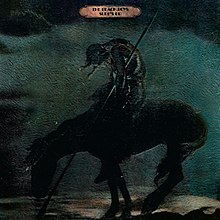Surf’s Up (album)
| Surf's Up | ||||
|---|---|---|---|---|
 |
||||
| Studio album by The Beach Boys | ||||
| Released | August 30, 1971 | |||
| Recorded |
|
|||
| Studio | Sunset Sound Recorders, United Western Studios, CBS Columbia Square, and Brian Wilson's home studio, Los Angeles | |||
| Genre | ||||
| Length | 33:56 | |||
| Label | Brother/Reprise (USA) EMI $tateside (UK) | |||
| Producer | The Beach Boys | |||
| The Beach Boys chronology | ||||
|
||||
| Singles from Surf's Up | ||||
|
||||
| Professional ratings | |
|---|---|
| Retrospective reviews | |
| Review scores | |
| Source | Rating |
| AllMusic | |
| The A.V. Club | (favorable) |
| Robert Christgau | B– |
| Encyclopedia of Popular Music | |
| Mojo | (favorable) |
| MusicHound | 4/5 |
| Pitchfork Media | 8.9/10 |
| Rolling Stone | |
| The Rolling Stone Album Guide | |
Surf's Up is the 17th studio album by American rock band the Beach Boys, released in 1971. It was met with a warm critical reception and reached number 29 on the US record charts, becoming their best-performing album in their home country since 1967. In the UK, the album peaked at number 15, continuing a string of chart successes that had not abated since 1965.
Both the album's title and cover artwork are an ironic, self-aware nod to the removedness from the band's surf rock roots. Its name was taken from the song of the same title written by Brian Wilson and Van Dyke Parks five years earlier for the abandoned studio album Smile. Surf's Up's creative direction was largely influenced by newly employed band manager Jack Rieley, who strove to reinvent the group's image and reintroduce them to the era's counterculture. Two singles were issued in the US: "Long Promised Road" and "Surf's Up". Only the former charted, peaking at number 89.
In 2004, the album was voted 154 in a German edition of Rolling Stone's "The 500 Greatest Albums of All Time" and ranked 61 on Pitchfork Media's "The Top 100 Albums Of The 1970s". It is listed in the musical reference book 1001 Albums You Must Hear Before You Die.
Sometime in 1969, erstwhile bandleader Brian Wilson opened a short-lived health food store called The Radiant Radish. While working there, he met journalist and radio presenter Jack Rieley. Rieley spoke with Brian for a radio interview, with the subject eventually turning to the unreleased song "Surf's Up", a track which had taken on almost mythical proportions in the underground press since the demise of the Smile album three years earlier. Brian rationalized: "It's just that it's too long. Instead of putting it on a record, I would rather just leave it as a song. It rambles. It's too long to make it for me as a record, unless it were an album cut, which I guess it would have to be anyway. It's so far from a singles sound. It could never be a single."
...
Wikipedia
